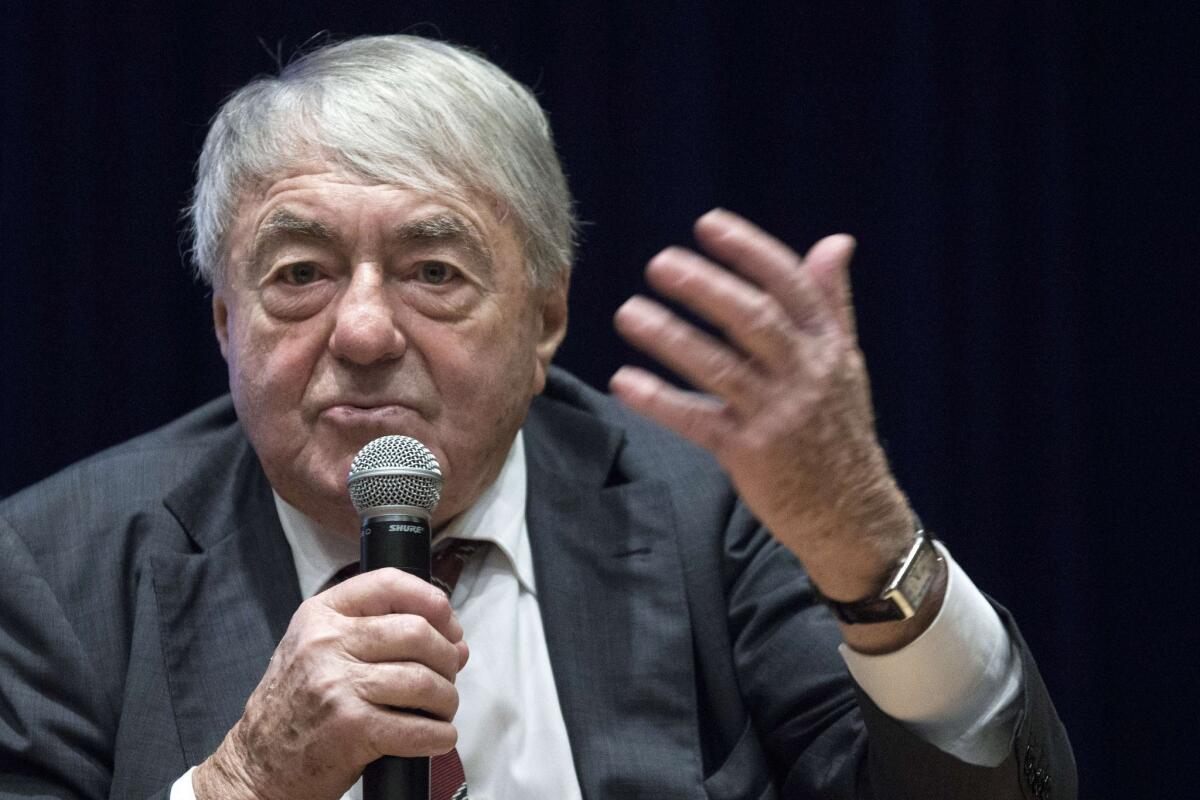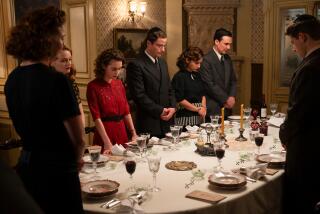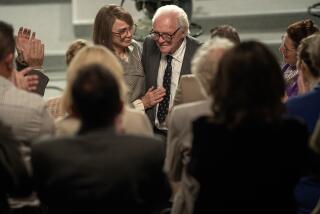‘Shoah’s’ Claude Lanzmann returns to ‘The Last of the Unjust’

When your previous work includes what is widely considered to be the definitive documentary on the Holocaust, how do you follow that up? French filmmaker Claude Lanzmann has returned over the years to the material that went into the making of his 9 1/2-hour 1985 landmark documentary “Shoah” and with his latest film, “The Last of the Unjust,” he again digs back into that past.
“The Last of the Unjust,” playing now in Los Angeles, is based on a series of filmed interviews conducted by Lanzmann with Benjamin Murmelstein in 1975. Murmelstein was the last surviving president of the Jewish Council, the so-called Elder of the Jews, appointed by the Nazis during World War II to oversee the Theresienstadt ghetto in Czechoslovakia. When Lanzmann tracked him down living in exile in Rome, where the interviews took place, Murmelstein had already long been a controversial figure, denounced by some as a Nazi collaborator.
Lanzmann appears in the footage of the original interviews, and he also appears in “Last of the Unjust” in more recent footage of himself returning to the remains of Theresienstadt.
BEST MOVIES OF 2013: Turan | Sharkey | Olsen
L.A. Times critic Kenneth Turan called the new film “an essay/meditation on the nature of good and evil, heroism and expediency.” In the New York Times, A.O. Scott said the film is “the portrait of an individual whose actions still defy comprehension, and the self-portrait of an artist consumed by the past.”
Even reviews that have been less-than-fully-glowing still acknowledge the film as a powerful document, such as J. Hoberman’s, which noted: “The best one can say for this troubling, if intermittently fascinating, mess is that it succeeds in raising questions, moral as well as aesthetic, that it cannot answer.”
Since “Shoah,” Lanzmann has made three other films using footage originally intended for that project. At the time, however, such as when he originally interviewed Murmelstein in Rome, Lanzmann wasn’t entirely certain what would become of his efforts.
GRAPHIC: Faces to watch 2014 | Entertainment
“I started on ‘Shoah’ in 1972, only I didn’t know what the film would be, what would be the heart of the film,” recalled Lanzmann during a recent phone call from Paris. “It took me a very long process to discover that ‘Shoah’ should not be a film about survivors, but a film about the reality of death, an epic film with constant tension and the inner workings of the tragedy all along.”
In France during the war, Lanzmann participated in resistance efforts and can now be seen as a survivor of sorts himself. At 88 years old -- “I have no age,” he said, “but you can look it up” -- Lanzmann even noted that he could see drawing a number of films from the trove of material compiled while making “Shoah.”
“People should never retire; one has to die straight on,” he said. Noting that he had recently caught a cold while in Rome he added: “Maybe I will die by the end of this conversation.”
CRITICS’ PICKS: What to watch, where to go, what to eat
Lanzmann noted that at the time of the interviews with Murmelstein, he had researched extensively about the Jewish Council and was well-aware of the accusations and counterclaims laid on Murmelstein. Hoping to cut through all that, he noted: “I wanted to understand, who was this man.”
“I was immediately struck by the formidable intelligence of the man, the very active sprit, his humor, his great knowledge,” he said. “The more and more I saw him, the more and more I understood him. I got a real sympathy for him, and him for me.
“You have to understand I was a crazy man, I could not know what I was going to do with these hours and hours and hours of interviews,” he added. “There is no producer insane enough to permit a man like me to spend that much time and money to interview a man, one man, for a film that even I didn’t know what it would be.”
PHOTOS: Actors who’ve been turned down for famous roles
As to whether he believed Murmelstein, Lanzmann added: “Yes, I had the impression he was fully honest with me.”
Lanzmann decided to revisit his encounter with Murmelstein after he became aware that the original interview footage, which had been housed in an archive, was recently being screened for the public. So he decided to use it himself. Yet he also came to the conclusion that, “I couldn’t make a movie only with Murmelstein. It was impossible, it would have been boring.”
And so Lanzmann decided to include himself, both then and now. Much of the writing that has built up over the years around ‘Shoah’ has noted that one of the film’s most remarkable aspects was that it used no archival footage, made up only of interviews and images that Lanzmann had captured. With “The Last of the Unjust,” there is a sense that he is breaking his own rules.
“At my age, the only thing I want to be is a free man, completely free. I’m free even from my past. I am free even from ‘Shoah,’” Lanzmann said.
“I am a prisoner of nothing, not even myself.”
ALSO:
Sundance 2014: Festival an immersion in inventive genre storytelling
Oscars 2014: Luncheon a ‘giant gumbo’ of nominees famous & anonymous
Sundance 2014: Schwartzman, Moss & tough loves of ‘Listen Up Philip’ [Video]
Twitter: @IndieFocus
More to Read
Only good movies
Get the Indie Focus newsletter, Mark Olsen's weekly guide to the world of cinema.
You may occasionally receive promotional content from the Los Angeles Times.







